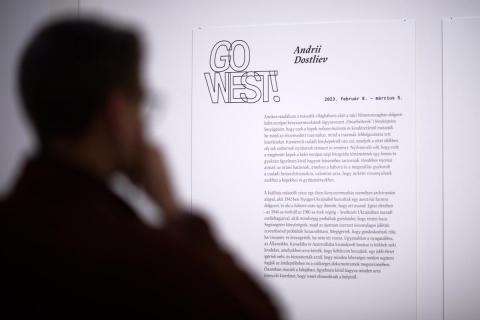IAS Fellow Andrii Dostliev's exhibition GO WEST!

Exhibition GO WEST! by the Ukrainian artist, curator and photography researcher, IAS Artist in Residence Andrii Dostliev is organized between February 8 and March 5 2023 by Blinken OSA Archives in collaboration with IAS CEU and Visual Studies Platform. This exhibition is a part of Andrii’s life-long study of memory, trauma, and identity through personal archives in Eastern Europe. GO WEST! resulted from Andrii’s engagement with the histories of forced laborers from Eastern Europe in Nazi Germany during the WWII.

The exhibition consists of two parts. The first one provides a visual and textual context of “Ostarbeiter” phenomenon — people who toiled in labor camps and private factories and farms of the Third Reich during the WWII. These stories fascinate the viewers with their sincerity while also betraying traces of profound traumas. They manifest how forced laborers coped with those traumas through correspondence and (self)photography by reclaiming agency through acts of self-presentation. In Andrii’s own words “their goal was not to record their own trauma, but to demonstrate their own dignity.” In times of unimaginable fear and hardships the small family photographs discovered by Andrii Dostliev were a way to support and give hope to people affected by the war whose experiences are often overlooked by historians. Although the exhibition presented only a small and seemingly isolated impact the WWII and occupation had on ways people documented and communicated their individual and group experiences, we are seeing a much vaster and profound layer of hitherto untold human history.

The second part of the exhibition zooms into a personal archive of an individual “Ostarbeiter” named Ivan who was brought from Western Ukraine to work on a farm in Austria in 1942. After the war, he chose to spend the rest of his life in that place. In a way, this part of the exhibition is a story of how an individual Ukrainian peasant experienced relocation, the war and the making of the post-war world. His archive of letters and photographs compiled between the 1940s and 1980s is a collection of voices of those who stayed in Soviet Ukraine and his fellow forced laborers who had moved on further West. Each interlocutor called, lured, or threatened Ivan to either return to Ukraine or to join them in the United States, Canada, or Australia. Others, wanted to come to Austria to see him. Yet, throughout his long life he dwelled in a stupor in the same Austrian village avoiding any contact with the state authorities or his kin, as if it was the only safe place for him to be. Ivan’s archive and disparate traces of his life present a story of a salient trauma dating back to 1942, which, however unique, is a shared trauma of millions of Ukrainian men and women who had survived the vortex of the 20th century.
